Like a finely tuned symphony, your Suzuki motorcycle's engine should perform with precision. When it doesn't, you might find yourself facing a myriad of engine issues that can disrupt your ride. You need to check various components, from the battery to the fuel system, to pinpoint what's going wrong. Have you considered how regular maintenance might play a crucial role in preventing these problems? Understanding the intricacies of troubleshooting can lead you to solutions that not only fix immediate concerns but also enhance your overall riding experience.
Quick Takeaways
- Check the battery for proper voltage and clean connections; a weak battery can prevent the engine from starting.
- Inspect spark plugs for wear and cleanliness; replace if fouled to ensure proper engine ignition.
- Verify fuel flow and check for blockages; clogged filters can lead to poor engine performance and misfires.
- Monitor coolant levels and inspect the radiator for leaks; overheating can result from low coolant or a malfunctioning radiator.
Engine Starting Problems
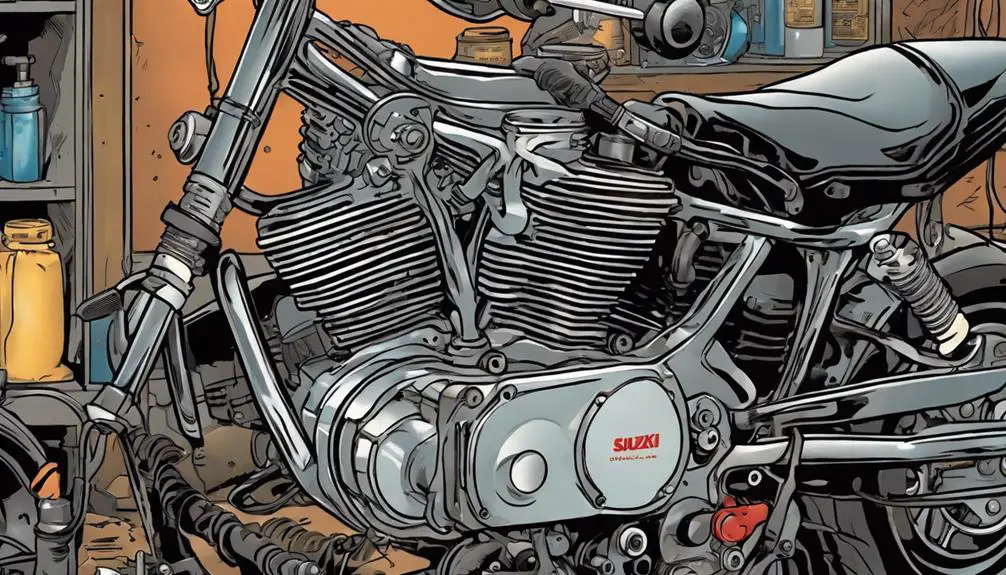
When your Suzuki motorcycle won't start, it can be frustrating, but identifying the cause is the first step to getting back on the road. Start by checking the battery; a dead or weak battery is often the culprit. Make certain the connections are tight and clean. If the battery seems fine, listen for a clicking sound when you press the start button—this might indicate a faulty starter relay.
Next, inspect the fuel system. Verify there's gas in the tank, and check the fuel lines for any leaks or blockages. If you've got fuel, but it still won't fire up, it may be time to look at the ignition system. Worn spark plugs can prevent your engine from starting, so inspect them and replace them if necessary.
Lastly, consider the kickstand and neutral safety switch. Sometimes, these overlooked components can prevent your bike from starting.
As you troubleshoot these issues, remember that each potential problem is a pathway to liberation, allowing you to reclaim the open road. Embrace the journey of discovery, and soon enough, you'll feel the wind in your hair again.
Overheating Issues
Overheating can strike unexpectedly, often stemming from issues in the cooling system or insufficient oil levels. If you notice your Suzuki motorcycle running hotter than usual, it's vital to act fast to prevent serious damage.
First, check your coolant levels; low coolant can lead to a rapid rise in temperature. If it's low, refill it with the appropriate mixture of coolant and water.
Next, inspect your radiator for any blockages or leaks. A dirty radiator can't dissipate heat effectively, so give it a good clean. Also, make certain that the radiator fan is functioning properly. If it's not kicking in when it should, you may need to replace the fan or check the electrical connections.
Don't forget to examine your oil levels too. Insufficient oil can cause friction, leading to overheating. If your oil's dirty or low, change it immediately.
Lastly, keep an eye on the thermostat. If it's stuck closed, it'll prevent coolant from circulating, resulting in overheating.
Poor Fuel Efficiency
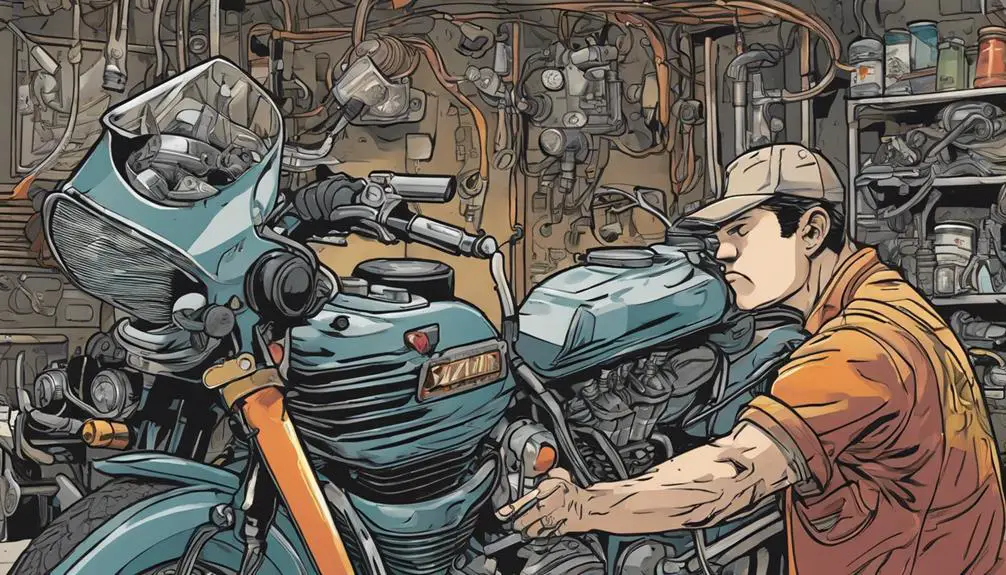
If you're facing poor fuel efficiency with your Suzuki motorcycle, several key factors could be at play.
You'll want to check the fuel quality, the condition of your air filter, and the performance of your spark plugs.
Addressing these issues can help you get back on the road with better mileage.
Fuel Quality Matters
Poor fuel quality can greatly diminish your Suzuki motorcycle's fuel efficiency, leading to frustrating rides and increased costs. When you fill up with subpar fuel, you're setting yourself up for performance issues that can drain your wallet and dampen your sense of freedom on the road. Low-quality gasoline often contains impurities and additives that can clog your engine, forcing it to work harder than necessary.
You deserve a ride that feels smooth and liberating, not one that sputters and struggles. To reclaim that thrill, be mindful of where you're getting your fuel.
Stick to reputable gas stations and, when possible, choose higher octane options recommended for your bike. This simple step can make a world of difference, not just in fuel efficiency but also in overall performance.
Air Filter Condition
A clogged air filter can choke your Suzuki motorcycle's engine, greatly reducing fuel efficiency and performance. When your air filter gets dirty, it restricts airflow, forcing your engine to work harder. This inefficiency translates into lower miles per gallon, draining your wallet with each ride. You want freedom on the road, not to be weighed down by poor fuel economy.
To liberate your ride, inspect your air filter regularly. If it's covered in dirt, dust, or debris, it's time for a change. A clean air filter allows your engine to breathe freely, leading to better combustion and improved performance.
You'll notice smoother acceleration and a more responsive throttle, making your rides even more exhilarating.
Spark Plug Performance
Spark plug performance directly impacts your Suzuki motorcycle's fuel efficiency, as worn or faulty plugs can lead to incomplete combustion and increased fuel consumption. When you're seeking the freedom of the open road, nothing should hold you back, especially not poor gas mileage caused by neglected spark plugs.
Check your plugs regularly. If they're worn, you might notice rough idling, misfires, or a decrease in power, all of which can drain your wallet at the pump. You want your ride to be smooth and liberating, not hindered by inefficient fuel usage.
Inspect the condition of your spark plugs; look for signs of wear, such as corrosion or excessive deposits. If they need replacement, don't hesitate—the benefits far outweigh the costs.
Using the correct type of spark plug for your model is essential. Refer to your owner's manual for specifications, and consider upgrading to high-performance options if you desire even more efficiency and power.
Unusual Noises From Engine
Unusual noises from your Suzuki motorcycle engine can signal various underlying issues that need immediate attention. Ignoring these sounds can lead to larger problems and diminish your ride's freedom.
Listen closely; a ticking or tapping noise might indicate valve clearance issues or worn components. If you hear a knocking sound, it could mean serious trouble with the engine bearings or a failing crankshaft.
A high-pitched squeal often points to a slipping or worn belt, which can impact your bike's performance and reliability. Meanwhile, grinding noises during acceleration may suggest transmission trouble, signaling that it's time for a thorough inspection.
Don't wait for the situation to worsen. Trust your instincts—if something feels off, it probably is. Grab your tools and check for loose parts or leaks, and don't hesitate to consult a mechanic if you're unsure.
Your motorcycle is more than just a machine; it's your ticket to freedom. Keep it in top shape, and it'll reward you with thrilling rides for years.
Stay attuned to its sounds, and take action whenever something doesn't feel right. Your freedom on two wheels depends on it!
Engine Misfiring
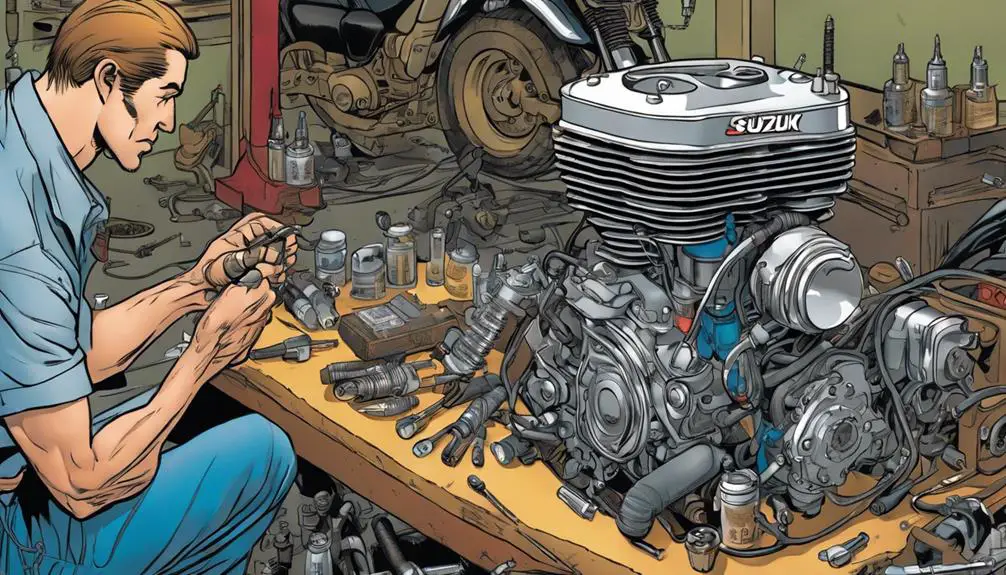
Engine misfiring can manifest as a sudden loss of power or rough idling, often signaling underlying issues that need prompt attention. When your Suzuki's engine misfires, it can feel like a jolt to your sense of freedom on the road. You might notice an erratic engine performance or a noticeable shake, disrupting your ride.
Start by checking your spark plugs. Worn or dirty plugs can cause misfiring, so it's crucial to replace them regularly. Next, inspect the ignition coils, as faulty coils can lead to inconsistent firing.
If you've got a fuel delivery issue, consider that clogged fuel injectors could be the culprit, robbing your bike of power. Don't forget to check for vacuum leaks; these can disrupt the air-fuel mixture, leading to misfires.
If you've tackled these basics and still face issues, it might be time to consult a professional mechanic. Ignoring engine misfires can lead to more significant problems down the line, robbing you of the exhilaration that comes from a smooth ride.
Embrace the journey of troubleshooting, and reclaim the full potential of your Suzuki motorcycle!
Oil Leaks and Consumption
Oil leaks and excessive consumption can signal serious issues with your Suzuki motorcycle, demanding immediate attention to prevent further damage. You might notice oil puddles beneath your bike or a drop in your oil levels more quickly than usual. These signs shouldn't be ignored; they could indicate a failing gasket, worn seals, or even a deeper engine problem.
First, check the oil filter and drain plug. If either is loose, tightening them could solve your problem. If the leak persists, inspect the gaskets and seals for wear or damage. Replacing these components can often restore your bike's integrity and performance.
Next, monitor your oil consumption. If you're topping off more frequently than expected, it's a signal that your engine might be burning oil. This could stem from worn piston rings or valve guides. Addressing these issues early on can save you from a costly rebuild down the road.
Embrace the freedom of riding your Suzuki without the weight of engine troubles. By swiftly tackling oil leaks and consumption, you'll not only maintain your bike's health but also reclaim the joy of the open road.
Electrical System Failures
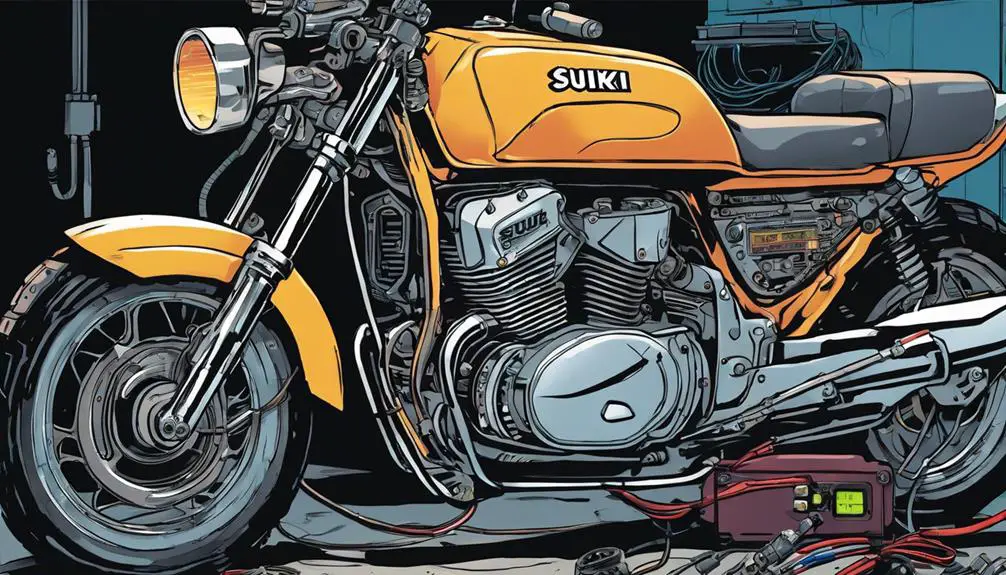
When you're facing electrical system failures on your Suzuki motorcycle, it's essential to check the battery voltage first.
If that's not the issue, inspect the wiring harness for any signs of damage or wear.
Battery Voltage Problems
Experiencing battery voltage problems can lead to frustrating electrical system failures in your Suzuki motorcycle. When your battery's voltage dips below the required level, you may notice issues like dimming lights, sluggish starting, or even complete shutdowns. It's essential to understand that a healthy battery is the lifeblood of your ride, empowering your freedom on the open road.
To tackle these battery voltage problems, start by checking the battery's overall health. You can use a multimeter to measure its voltage; anything below 12.4 volts indicates your battery might be underperforming. If you find that your battery's voltage is insufficient, consider recharging or replacing it.
Next, look at the charging system. A malfunctioning stator or regulator can prevent your battery from receiving adequate voltage. Keep your connections clean and secure; corrosion or loose terminals can disrupt the flow of power.
Wiring Harness Inspection
Inspecting the wiring harness is crucial for identifying and resolving electrical system failures in your Suzuki motorcycle. Begin by visually examining the harness for any signs of wear, fraying, or corrosion. Look closely at connectors and terminals; they should be clean and secure. Loose connections can lead to erratic electrical behavior, so make sure everything's snug.
Next, check for any exposed wires or insulation damage. If you find any, it's essential to repair or replace them to prevent shorts or further damage. Use a multimeter to test the continuity of the wires. This step can highlight any breaks that mightn't be visible to the naked eye.
Don't forget to inspect grounding points; a poor ground can disrupt your entire system. Clean any corrosion you find and make sure the connections are tight.
Lastly, trace the wiring from the battery to the components, ensuring that there are no obstructions or wear points that could lead to failure.
Ignition System Troubleshooting
Troubleshooting the ignition system is essential for guaranteeing your Suzuki motorcycle starts reliably and runs smoothly. If your bike's not firing up, you'll want to check a few key components.
Start with the spark plugs; make sure they're clean and gapped correctly. Worn or fouled plugs can prevent ignition, so replace them if needed.
Next, inspect the ignition coil. Use a multimeter to test its resistance. If it's out of spec, it might be time for a replacement.
Also, examine the ignition switch and wiring for any signs of damage or wear. A faulty switch can kill your bike's power.
Don't forget about the battery. A weak or dead battery is a common culprit in ignition issues. Confirm it's fully charged and in good condition.
Carburetor and Fuel System Issues
When your Suzuki motorcycle struggles to start or runs poorly, the carburetor and fuel system often play an essential role in the problem.
Start by checking the fuel flow. If you're not getting a steady stream, it could be a clogged fuel filter or a blocked fuel line. Clear any debris and guarantee fuel is reaching the carburetor.
Next, inspect the carburetor itself. Open it up and look for dirt or varnish buildup. This gunk can prevent the proper flow of fuel and air. Clean the jets and passages with carburetor cleaner, guaranteeing everything is free of obstructions. Also, check the float level; if it's too high or low, it can lead to flooding or starvation.
Don't overlook the air filter. A dirty filter restricts airflow, affecting your engine's performance. Replace or clean it if needed.
Lastly, if you've gone through these steps and still face issues, consider the possibility of a fuel pump malfunction. Guarantee it's operating correctly to maintain the right pressure.
Regular Maintenance Tips
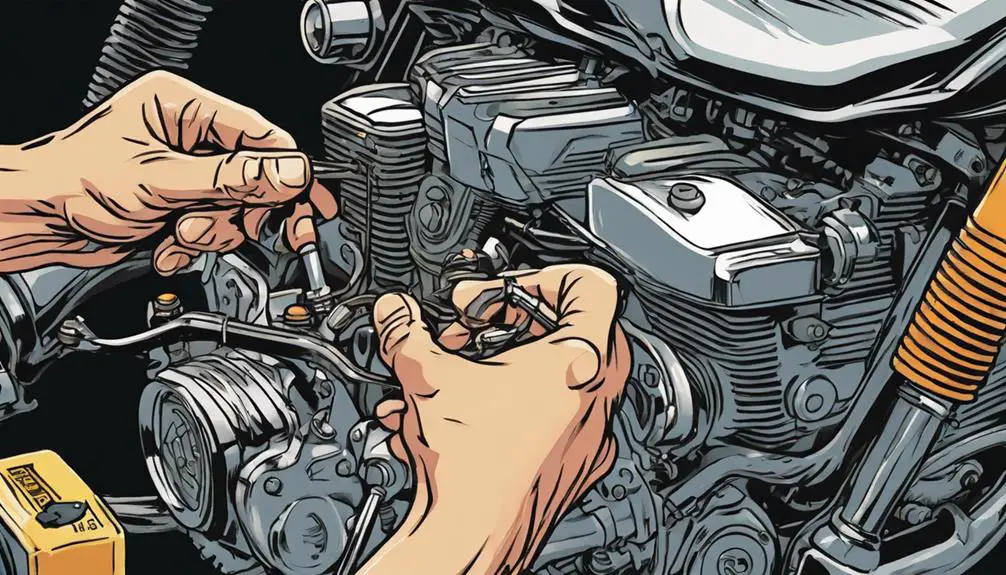
Maintaining your Suzuki motorcycle regularly can prevent many engine issues, including those stemming from the carburetor and fuel system. Embracing routine care not only keeps your bike running smoothly but also enhances your riding experience. You deserve the freedom of the open road without the burden of unexpected repairs.
Here are three essential maintenance tips to keep your engine in prime shape:
- Check and Change the Oil: Regular oil changes guarantee your engine runs smoothly and prolong its life. Aim for every 3,000 to 5,000 miles, or check your owner's manual for specifics.
- Inspect the Air Filter: A clean air filter boosts engine performance by providing peak airflow. Check it every month and replace it if it looks dirty or clogged.
- Monitor Fuel Quality: Using high-quality fuel helps prevent carburetor issues. Fuel can degrade over time, so if you're storing your bike, consider using a fuel stabilizer.
Common Questions
How Do I Diagnose a Weak Battery in My Suzuki Motorcycle?
To diagnose a weak battery, start by checking the battery voltage with a multimeter. If it reads below 12.4 volts, it's likely weak.
Next, inspect the terminals for corrosion and verify they're tight.
Try jump-starting your bike; if it starts, the battery may need replacing.
Also, consider how old the battery is—if it's over three years, it might be time for a new one.
Trust your instincts; you know your ride best!
What Are Common Signs of a Failing Ignition Coil?
A failing ignition coil can feel like a wavering flame, flickering on the verge of extinguishing.
You might notice rough idling, stalling, or difficulty starting your engine. Your bike may also backfire or lose power during acceleration.
If you experience a decrease in fuel efficiency, that's another sign.
Trust your instincts; if your ride isn't performing as it should, it's time to investigate deeper into the ignition system.
How Can I Improve Throttle Response on My Suzuki Motorcycle?
To improve throttle response on your Suzuki motorcycle, start by checking your air filter; a clean filter allows better airflow.
Next, consider adjusting the fuel mixture for ideal combustion.
You might also want to upgrade your throttle cables for smoother operation.
Regularly inspect your spark plugs, too, as they play an essential role.
What Tools Do I Need for Basic Engine Troubleshooting?
Imagine you're a chef in a bustling kitchen; without the right tools, your culinary masterpiece could fall flat.
For basic engine troubleshooting, you'll need a few essentials: a socket set, screwdrivers, a multimeter, and a compression tester.
These tools empower you to explore the heart of your machine, examining its inner workings.
Just like in cooking, mastering your tools means you can create a smooth ride and release the full potential of your engine.
How Often Should I Check My Motorcycle's Spark Plugs?
You should check your motorcycle's spark plugs every 5,000 to 10,000 miles, or at least once a season.
Regular checks keep your engine running smoothly and help you catch issues early.
If you're riding hard or in tough conditions, consider checking them more often.
Trust your instincts—if you notice performance problems, inspect those plugs right away.
Staying proactive guarantees you enjoy the freedom of the open road without unexpected interruptions.
Wrapping Up
In the grand journey of motorcycle ownership, your Suzuki's engine is like a trusty steed.
When it stumbles, don't just brush it off; listen to its whispers. Each issue, from overheating to misfiring, is a signpost guiding you to better care.
Embrace regular maintenance as your map, ensuring smooth rides ahead. By tending to your bike's needs, you forge a strong bond, transforming every ride into an adventure worth cherishing.
Keep your steed happy, and it'll take you far!